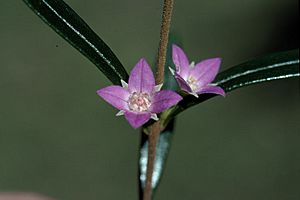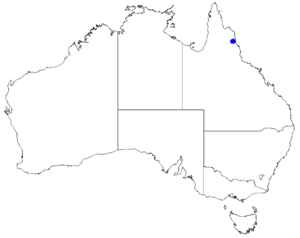Boronia excelsa facts for kids
Quick facts for kids Boronia excelsa |
|
|---|---|
 |
|
| Scientific classification |
|
| Kingdom: | Plantae |
| Clade: | Tracheophytes |
| Clade: | Angiosperms |
| Clade: | Eudicots |
| Clade: | Rosids |
| Order: | Sapindales |
| Family: | Rutaceae |
| Genus: | Boronia |
| Species: |
B. excelsa
|
| Binomial name | |
| Boronia excelsa Duretto
|
|
 |
|
| Occurrence data from Australasian Virtual Herbarium | |
| Script error: The function "autoWithCaption" does not exist. | |
Script error: No such module "Check for conflicting parameters".
Boronia excelsa is a special plant. It belongs to the citrus family called Rutaceae. This plant is endemic, which means it only grows naturally in a small area. You can find it in Far North Queensland, Australia. It is a type of shrub with fuzzy branches. Its leaves are simple, meaning they are not divided. They also grow directly from the stem without a stalk. The plant has pretty pink to white flowers, each with four petals.
Contents
What Boronia excelsa Looks Like
Boronia excelsa is an upright shrub. It has many branches that feel woolly or hairy. This plant can grow quite tall, up to about 3 m (10 ft) high.
Leaves and Flowers
The leaves of Boronia excelsa are simple and shaped like an oval. They are 14–60 mm (0.6–2 in) long and 2–6 mm (0.08–0.2 in) wide. The bottom side of the leaves is much lighter in color than the top.
The flowers are pink or white. They grow one by one where a leaf joins the stem. Each flower sits on a small stalk called a pedicel, which is 2–4 mm (0.08–0.2 in) long.
Flower Parts
Each flower has four sepals. Sepals are like small leaves that protect the flower bud. These sepals are egg-shaped or triangular. They are about 3 mm (0.1 in) long and 1.5 mm (0.06 in) wide. Their backs are very woolly and hairy.
The four petals are 4.5–5 mm (0.18–0.20 in) long and 2–3 mm (0.08–0.1 in) wide. Inside the flower, there are eight stamens, which are also hairy. The style (part of the female reproductive organ) is smooth.
When it Flowers and Fruits
Boronia excelsa usually blooms in July and August. After flowering, it produces a fruit. This fruit is a smooth capsule. It is about 4.5 mm (0.2 in) long and 2 mm (0.08 in) wide.
How it Got its Name
The plant Boronia excelsa was first officially described in 1999. This was done by a scientist named Marco F. Duretto. He wrote about it in a science journal called Austrobaileya.
Meaning of the Name
The second part of its scientific name, excelsa, comes from a Latin word. It means "high" or "lofty". This name was chosen because this type of boronia grows in higher places.
Where Boronia excelsa Lives
This boronia plant grows in wet forests. It also likes to live near the edges of rainforests. You can find it at altitudes above 1,000 m (3,000 ft). It is only found in the Mount Windsor Tableland area of Queensland.
Its Conservation Status
The Queensland Government's Department of Environment and Heritage Protection has classified Boronia excelsa as "least concern." This means that the plant is not currently at risk of disappearing.
 | Sharif Bey |
 | Hale Woodruff |
 | Richmond Barthé |
 | Purvis Young |

